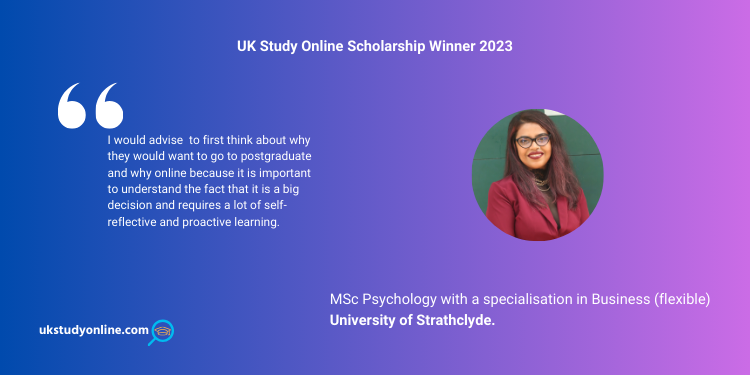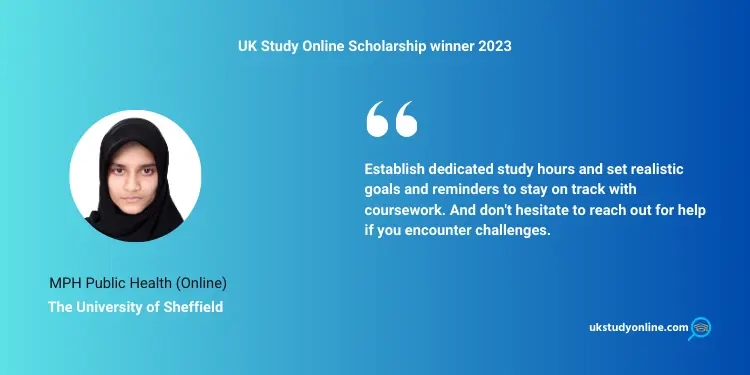2023 is the second year we have run the UK Study Online Scholarship draw. This year, we increased the number of winners, helping more students achieve their goals. You can read their interviews below.
Register for the 2024 Scholarship Draw
To register for the 2024 UK Study online Scholarship Draw, you just need to be an active newsletter subscriber. You can register here.
Study Options
Understanding which universities offer online degrees and master’s, the costs and how to fund your studies all take time and planning. You can use our guides to help you understand what support is available and which universities offer the degree online that you are interested in.
Resources and Guides
We have put together a set of articles and guides to help you.
Returning to Study Resources
Online Degrees From UK Universities
Search Online Master’s Degrees
Scholarship Winner Interviews
Can you tell us a bit about your background and why you are returning to study?
Hello! My name is Anika P and I am currently living and working in Bangladesh. I have previously studied and worked in the UK so this is my second stint at studying in a higher education level in the UK but this time, remotely.
My previous degree was an MSc. In International Human Resource Management from Coventry University.
I am currently doing my MSc. In Psychology with a specialisation in Business from University of Strathclyde, with an aim to eventually become a chartered occupational psychologist. I have been working in HR for almost 10 years now (both part-time while I was studying and full-time). Hence, the degree seemed like a natural progression for a non-psychology major like me to proceed to becoming a chartered occupational psychologist.
After practising HR for as long as I did, I do believe I have the business part of the understanding sorted but now I need to integrate the psychological elements to my learning in order to fully delve into my core interest area, which is DEIB(Diversity, Equity, Inclusion and Belonging), especially for BIPOC and/or BAME women at work.
How do you feel at the start of studying at postgraduate level online?
I am excited and a bit nervous at the same time since it does get overwhelming at times, especially the science and statistics part which I have been actively away from it for a very long time.
However, this time around, I am determined to grasp the knowledge and face my fear so that I can progress to the next part of my learning journey to Occupational psychology.
As this is my first time doing a 180 credit program remotely, I was afraid of the isolation aspect of it but fortunately, the cohort along with the faculty are extremely supportive and responsive when it comes to any issues. So thus far, it has been good.
How did you research and decide on the course?
I have been researching schools since 2020 for a conversion program in psychology. Considering my progression would be Occupational/I-O/Work Psychology, I was mainly going through the universities with the following criteria:
1) Strong psychology and business department as Work psychology is an amalgamation of them both.
2) Incorporation of some of the work psychology elements to the conversion program.
3) If I want to continue my training after the completion of my conversion master’s to Work/I-O/Work psychology, the University should already have that program available.
4) The approach to learning and research was more modern and global market situation driven.
5) Ranking of both Psychology and Business in Guardian University Ranking. It’s not that I was looking for the best one rather a university that has been consistently growing.
Initially, the online part didn’t come to my mind but once I saw it was available, cost friendly and easier to continue while working and caring for family back home, I started looking more into the online conversion programs in UK. I looked through the program website, course details, fees, ongoing research, and teaching staff profile.
At the end, I chose University of Strathclyde’s MSc in Psychology with a Specialisation in Business because it was the closest match to the above criteria. Another thing, which I wasn’t looking for but found to be extremely friendly for mature and working students, is their flexible option other than the traditional part-time and full-time studies. This seemed to be more inclusive for working professionals and primary caregivers.
Is this your first experience with online learning? How are you managing your time and fitting study in?
I have done smaller certification courses online during the pandemic, but this is my first time doing a master’s online.
Fortunately, I switched to a fully remote flexible job hence it has been much easier than it would have been since I don’t have to worry about commute timings. I usually get my work done early and then fit the studies in the evening. I have divided and rotated it in such a way that I don’t get overwhelmed, but I am still on track when it comes to my learning.
From your experience so far of researching, selecting and starting online study, what advice would you give to someone at the start of the process?
I would advise them to first think about why they would want to go to postgraduate and why online because it is important to understand the fact that it is a big decision and requires a lot of self-reflective and proactive learning. Offsite learning might not be suited for everyone. Hence, you must truly justify your reasons to yourself first. Then start looking for universities which cater to your requirements the best way possible.
The university doesn’t have to be the best, but it needs to cater to your prospects and requirements the best way possible. Email them as many Universities have virtual open days and information sessions held online. Many times, we whimsically choose programs and later drop out or regret so dig in as much as possible to get the best required information to make a decision. The rest will fall into place.
Can you tell us a bit about your background and why you
are returning to study?
After completing high school in Qatar, I began exploring options for my
bachelor’s degree and found that biomedical sciences piqued my
interest. In 2018, at 18, I travelled to Malaysia as it would offer me an
opportunity to learn about diverse cultures and cuisines, complementing
my undergraduate experience. Upon returning home after graduation, I
found myself at a crossroads as I wanted to pursue something that
transcends research and the laboratory setting – to contribute to global
health and wellness. This led me to study Master of Public Health (MPH)
online at the University of Sheffield.
How do you feel at the start of studying at postgraduate
level online?
At the beginning of my MPH course, I felt both excited and nervous.
Delving into a course that is different from that of my bachelor’s was
intriguing but at the same time, I was uncertain about how the transition
to postgraduate studies, particularly in an online format, would unfold.
Fortunately, the university’s comprehensive information resource and
constant support quelled my concerns. Chatting with final-year students
further offered me a clearer perspective on what to expect. To me, the
best part about an online master’s degree is being able to study at your
own pace from the comfort of home.
How did you research and decide on the course?
Initially, I was torn between choosing biomedical science-related courses
and public health for my master’s degree. So, I considered the
curriculum, course accreditation and reputation of several universities for
those fields. I also read reviews from students who had taken similar
courses. In the end, I decided that studying MPH at the University of
Sheffield would be a great fit for me, given that the course aligned with
my interests and the university has a strong reputation for academic
excellence and an expert faculty.
Is this your first experience with online learning? How are you managing your time and fitting study in?
Yes, this is my first time studying online. Having been accustomed to
traditional classroom settings during my undergraduate years, it’s
refreshing to experience the flexibility that online learning offers. This
flexibility has allowed me to tailor my study schedule to fit my personal
rhythm, accommodating other commitments. I was initially a bit lost while
navigating the online platform, Blackboard, that my university uses but
quickly got a hang of it. Course modules are well organised, with
supplementary resources and discussion boards to interact with the
module leaders and peers. It’s easier to keep track of deadlines and
updates with announcements on Blackboard. I manage my time by
setting aside dedicated study hours each week to focus on coursework
and participate in online discussions. I try to stick to my study schedule
as much as possible.
From your experience so far of researching, selecting and
starting online study, what advice would you give to
someone at the start of the process?
My advice to someone at the start of the process would be to first take
your time and do your research. Consider factors such as accreditation,
faculty credentials, and the support services offered by the university.
Make sure that you choose a course that is a good fit for your needs and
interests, plus contact the university for the prospectus and further
enquiries, and read student reviews regarding your course. Next, after
enrolling, create a study schedule that will allow you to balance your
work, personal life, and studies. Establish dedicated study hours and set
realistic goals and reminders to stay on track with coursework. Also,
discipline is key in online learning. Finally, don’t hesitate to reach out for
help if you encounter challenges. Whether it’s technical issues,
academic concerns, or the need for clarification on course content,
universities offer support services to assist online learners, such as
discussion boards and online workshops.


